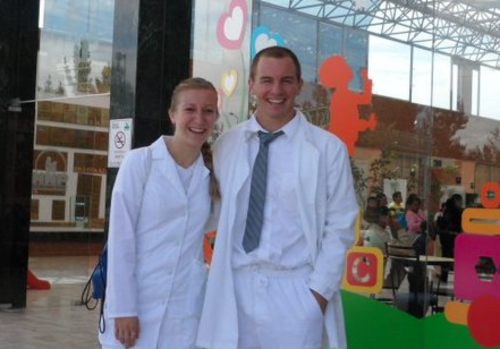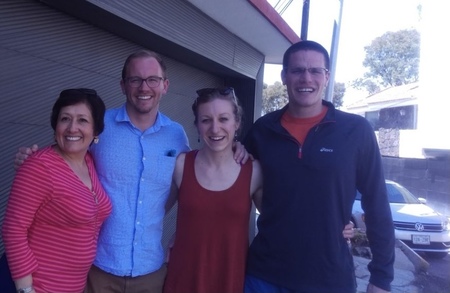Puebla alumni series: Mitch Day ‘12

Mitch Day is a 2012 Notre Dame graduate and majored in science pre-professional studies and Latino studies. Day writes about his time in Puebla and how it influences his work as a medical officer for both the Navy and Marines.
Mexico is directly connected to the United States in every domain—land, sea, air, space, cyber, and values. Similar to the United States, the Mexican health care system has deep- seated “social determinants of health” or, in other words, the economic and social conditions that influence health outcomes for different portions of its population. Newly emerging infectious diseases, like COVID-19, serve to highlight these gaps. In my work as a medical officer for a Marine aviation squadron, the ability to identify and navigate some of these gaps has proven hugely helpful in my clinical care for our squadron’s diverse cohort of Marine aircraft maintainers, air crew, and pilots. This knowledge base began, in large part, through my experiences abroad with Notre Dame’s Puebla Program.
As a junior at Notre Dame enrolled in the Naval ROTC program, I had little insight into the world functioning beyond the sidewalks that connected Siegfried with Pasquarella and Jordan. Fortunately, the study abroad program is part of the culture at Notre Dame and gratefully the ROTC program ensured its midshipman benefited from the opportunity. Puebla’s program was appealing specifically for two reasons. Professionally, it offered exposure to the Mexican healthcare system and personally, it promised an adventurous immersion into the language and culture.
At the time, Lisette Monterroso was the program coordinator responsible for supplementing the students’ in-class coursework with pre-clinical rotations. In pairs, the Notre Dame students set off throughout the city to accompany and safely observe licensed Mexican medical professionals in their work. With great excitement, Olivia Redline (fellow class of 2012 graduate and perhaps the brightest of our pre-med Puebla cohort) and I came to appreciate our explorations of Puebla’s public and private systems of health care. Like the local population, we grew savvy in our ability to navigate the public transportation system. However, it became increasingly apparent that not everyone enjoyed the same level of health care. In one public sector hospital, for example, we encountered long lines of sick patients awaiting overly tasked and often junior medical professionals. These young doctors completing their residencies sifted through paper medical records and logged their treatment plans using typewriters. This morning chaos was often followed by afternoon shifts spent shadowing in one of Puebla’s private hospitals. There the physicians hosted us for expensive lunches while the highly sought-after CT and MRI machines in the background hummed vacantly.
In an effort to contrast urban and rural differences, Lisette organized multiple, week-long excursions into some of the geographically- isolated and indigenous communities surrounding Puebla. There, the determinants of health broadly included geographic and technical isolation, as well as ethnic and cultural influences, like traditional birth attendants and herbal remedies. A collective semester of this style of practical learning, combined with a longitudinal curriculum of Mexican history and sociology courses at the Universidad de las Américas Puebla, provided formative fodder for lifelong study of these healthcare determinants upon return to Notre Dame. These lessons proved especially relevant as my pre-medical and eventual graduate medical education increasingly centered on the biomedical and clinical skills expected of a doctor.

In retrospect, critics of study abroad experiences in Latin America, like Notre Dame’s Puebla program, express appropriate concern for their susceptibility to ethical mishaps. Pitfalls for undergraduate students range from unintentional cultural disrespect and misplaced intentions to blatant and dangerous participation in clinical encounters beyond their proper training. Furthermore, themes of neocolonialism, in which students from the U.S. travel to participate and benefit from relatively short-term international health trips at the expense of the local population, is problematic.
In my experience, the Puebla program attempted to address these concerns two-fold. Locally, it was mitigated through the supervision and tenured experience of Lisette, the program coordinator. With her years of experience and community relationships, she had cultivated a mutual understanding and accountability amongst many of the students and preceptors that did not permit any rash or opportunistic medical care that was beyond their level of training. On a larger level, however, the program, though far from campus, embodied the ethos of Notre Dame and its emphasis on religious teachings of social justice. Specifically, we made the humble admission that we were not there to gain “experience” at the expense of the population, but rather to understand and dismantle our own contributions to the inequality that has led to such wide spread gaps in health.
Despite its potential critics, Notre Dame’s Puebla program profoundly shaped my work as a physician now practicing in the US military. In my direct clinical encounters, I not only tout the incredible value of the US Military’s essentially universal health care system, but I work to intentionally recognize and overcome some of the gaps for the Marines as they engage with this system. The work starts with forming a personal connection with the Marines in their squadron workspaces in an effort to be more accessible. These interactions have led to better insight into their own logistical and cultural barriers to healthcare, whether it be the varying levels of health literacy or the cultural belief that Marines are immortal and therefore immune to ailment.
Social determinants of health that lead to major gaps in health care are not unique to Puebla, or for that matter South Bend. Influences such as income, insurance status, education, language and geography exist everywhere and are only a few examples of the factors a patient must navigate to receive the care they deserve. Fortunately, Notre Dame’s Puebla program is intentional in its mission to educate its pre-medical students in these essential lessons of health at a formative time, long before they become professionally qualified to make clinical decisions on their own.
Learn more the study abroad program in Puebla.